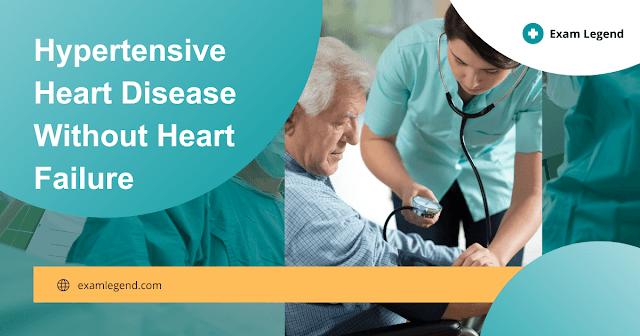Hypertensive Heart Disease without Heart Failure: A Detailed Article on this Keyword
Hypertensive heart disease is a condition that occurs when high blood pressure causes damage to the heart. It is one of the leading causes of death worldwide and is a major risk factor for heart attacks, heart failure, and stroke. However, hypertensive heart disease without heart failure is less well known, yet it is an important topic that requires attention. In this article, we will explore the causes, symptoms, diagnosis, treatment, and prevention of hypertensive heart disease without heart failure.
Causes of Hypertensive Heart Disease without Heart Failure
The primary cause of hypertensive heart disease without heart failure is hypertension or high blood pressure. High blood pressure can cause damage to the heart by making it work harder to pump blood. This extra workload can lead to thickening of the heart muscle, which in turn, reduces the heart's ability to function efficiently. Hypertension can also lead to the narrowing of the arteries that supply blood to the heart, which can cause chest pain or angina.
Symptoms of Hypertensive Heart Disease without Heart Failure
In its early stages, hypertensive heart disease without heart failure may not produce any noticeable symptoms. As the disease progresses, however, symptoms may start to appear. These include shortness of breath, chest pain, fatigue, and dizziness. Patients with hypertensive heart disease may also experience heart palpitations, which is a sensation of feeling their heart beating rapidly or irregularly.
Diagnosis of Hypertensive Heart Disease without Heart Failure
To diagnose hypertensive heart disease without heart failure, a doctor will take a detailed medical history and perform a physical examination. They will also order blood tests to check for high cholesterol and diabetes, as well as an electrocardiogram (ECG) to evaluate the heart's electrical activity. An echocardiogram may also be done to assess the structure and function of the heart.
Treatment of Hypertensive Heart Disease without Heart Failure
The primary goal of treating hypertensive heart disease without heart failure is to control high blood pressure. This can be achieved through lifestyle changes, such as eating a healthy diet, getting regular exercise, and quitting smoking. In some cases, medication may also be prescribed to help lower blood pressure. Patients may also need to take medications to manage any underlying conditions, such as high cholesterol or diabetes.
Prevention of Hypertensive Heart Disease without Heart Failure
Preventing hypertensive heart disease without heart failure requires making healthy lifestyle choices. This includes maintaining a healthy weight, eating a diet rich in fruits, vegetables, and whole grains, limiting sodium intake, avoiding tobacco products, and getting regular exercise. Regular monitoring of blood pressure is also important, as is managing any underlying conditions such as high cholesterol or diabetes.
FAQs
Q: Can hypertensive heart disease without heart failure be cured? A: There is no cure for hypertensive heart disease without heart failure, but it can be managed through lifestyle changes and medication.
Q: Who is at risk of developing hypertensive heart disease without heart failure? A: Anyone with high blood pressure is at risk of developing hypertensive heart disease without heart failure.
Q: Can hypertension be prevented? A: Hypertension can be prevented by making healthy lifestyle choices such as maintaining a healthy weight, eating a healthy diet, and getting regular exercise.
Q: Is hypertensive heart disease without heart failure the same as congestive heart failure? A: No, hypertensive heart disease without heart failure is a separate condition

Comments
Post a Comment